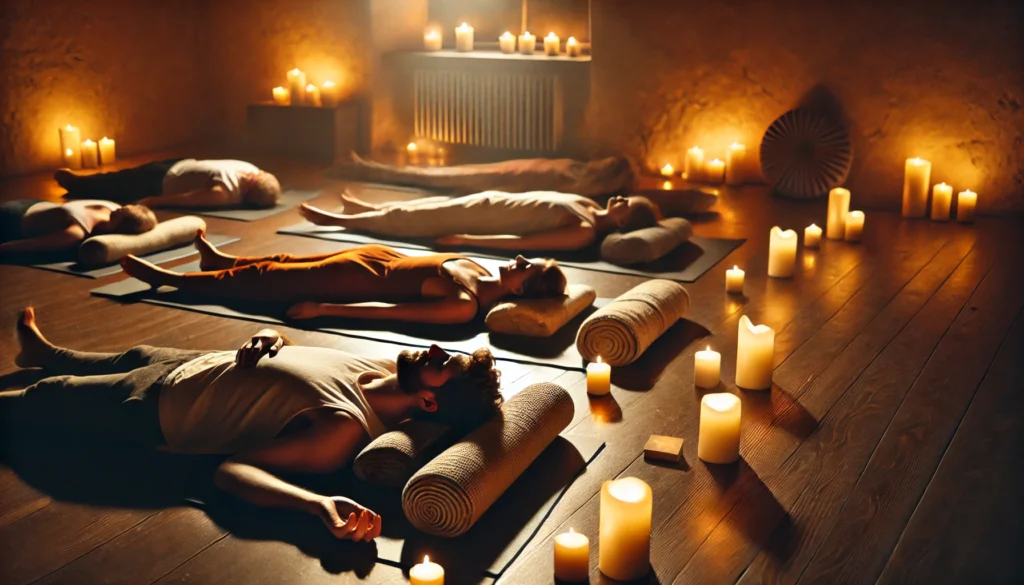Insomnia is a common sleep disorder that can make it hard to fall asleep, stay asleep, or cause you to wake up too early and not be able to get back to sleep. It can sap not only your energy level and mood but also your health, work performance, and quality of life.
How often do you find yourself tossing and turning at night, unable to drift off into a peaceful slumber? If the answer is ‘often’, you’re not alone.
Millions of people worldwide struggle with insomnia, and it’s a problem that can feel insurmountable. But there’s good news.
Emerging research suggests that regular physical activity could be a powerful weapon in the fight against insomnia.
This article will delve into the science behind how specific types of workouts can improve sleep quality. We’ll explore the best workout classes for people with insomnia, offering practical advice and routines that can be incorporated into your lifestyle.
Whether you’re a health and wellness coach, a science journalist, or a biohacker, this comprehensive guide will provide you with the latest scientific research and trends on the topic.
So, if you’re ready to swap those sleepless nights for restful ones, read on. Let’s explore how the right workout class could be your ticket to a good night’s sleep.
You May Also Like: Sleep Hygiene: Key Practices for Health
Understanding Insomnia and Its Impact on Health
Insomnia affects millions globally, touching every age group. It’s more than just difficulty sleeping; it impacts daily functioning too.
When we think about insomnia, poor sleep is just the tip of the iceberg. The repercussions run much deeper, affecting physical, emotional, and mental health.
Sleepless nights lead to fatigue, lack of concentration, and irritability during the day. These symptoms can wreak havoc on professional and personal lives.
Over time, chronic insomnia can invite serious health issues. Some of these include an increased risk of heart disease, diabetes, and even mental health disorders like depression and anxiety.
In understanding insomnia, it’s vital to recognize its diverse causes. They range from stress and poor sleep habits to medical conditions and medications.
Common symptoms of insomnia include:
- Difficulty falling asleep
- Waking up often during the night
- Waking up too early
- Daytime sleepiness or low energy
The link between sleep and health is undeniable. Thus, tackling insomnia should be a priority for anyone seeking overall well-being. Sleep is essential for cognitive function, immune performance, and emotional resilience.
Through a multifaceted approach, focusing on sleep hygiene and lifestyle changes like incorporating the right workout routine, tackling insomnia is possible.
The Science of Sleep and Exercise
Exercise and sleep share a symbiotic relationship. Understanding this connection can help improve sleep quality.
Physical activity affects sleep at a physiological level. It increases the amount of energy spent, triggering a restorative need for sleep.
Exercise also helps regulate circadian rhythms. This regulation is crucial because it aligns sleep-wake cycles, making falling asleep easier.
Moreover, working out boosts the production of sleep-promoting substances. Hormones like serotonin and melatonin play key roles in enhancing sleep quality.
Research consistently shows that regular exercise can reduce the severity of insomnia symptoms. It’s not a guaranteed cure, but it certainly helps.
For example, a workout routine can offer these sleep benefits:
- Longer sleep duration
- Improved sleep quality
- Reduced need for sleep medications
- Increased daytime alertness
Despite the benefits, timing and type of exercise matter. Late evening workouts can sometimes have a stimulating effect, delaying sleep onset.
Choosing the right workout, based on personal sleep patterns, is essential. Some find morning routines invigorate their sleep cycles, while others prefer afternoon activities.
Lastly, exercise offers indirect sleep benefits by reducing stress and anxiety. Lower stress levels naturally promote more restful sleep.
By incorporating exercise into daily life, the path to improved sleep becomes much clearer. Understanding this science is a step towards achieving that goal.

Best Types of Workouts for Improving Sleep
A well-chosen workout can significantly enhance your sleep quality. Different types of exercise offer unique benefits for those with insomnia.
When considering exercise, variety is key. Whether it’s aerobic, strength, or flexibility training, each supports better sleep in diverse ways.
Balancing high-intensity and gentle activities throughout the week can be beneficial. This balance prevents overstimulation while promoting relaxation.
It’s important to select workouts that you enjoy. Enjoyable exercises increase motivation, ensuring you stick to your routine.
Listening to your body is crucial. Adjust workouts based on how you feel and your sleep patterns.
Properly timing your exercises can make a huge difference. Certain workouts are more effective when performed at specific times of the day.
Combining different exercise types can yield optimal results. For instance, pairing aerobic activity with yoga leads to improved sleep.
Lastly, creating a sustainable exercise habit is important. Consistency in your routine fosters better long-term sleep health.
Aerobic Exercises
Aerobic exercises boost heart rate and improve cardiovascular health. This process also aids in regulating sleep cycles.
Activities like brisk walking, cycling, and swimming fall into this category. They help reduce insomnia by burning energy efficiently.
Increased heart rate during aerobic activities produces mood-elevating endorphins. These natural chemicals lower stress, promoting restorative sleep.
Practicing moderate-intensity aerobics in the morning or afternoon enhances sleep quality. This timing avoids potential overstimulation before bedtime.
Yoga and Mindfulness Practices
Yoga combines physical postures with breath control and meditation. It’s a formidable ally for tackling insomnia.
This practice encourages deep relaxation and stress reduction. It calms the mind and prepares the body for restful sleep.
Mindfulness, often integrated into yoga, trains attention and awareness. This mental focus reduces insomnia-related anxiety.
Yoga sessions in the evening transition the body into sleep mode. They offer a gentle, soothing way to end the day.
Resistance Training and Sleep Quality
Resistance training involves weight lifting and body-weight exercises. It’s known for building muscle and increasing strength.
This type of workout contributes to improved sleep patterns. It helps balance hormones related to sleep and stress regulation.
Performing resistance exercises during the day enhances sleep onset and depth. Evening workouts should be moderated to avoid overstimulation.
Progressive resistance routines can increase sleep duration. They also improve the overall quality of slumber through stress reduction.
Low-Impact Workouts and Stretching
Low-impact exercises, such as walking and water aerobics, are gentle yet effective. They provide the benefits of movement without straining the body.
These activities prepare the body for deep sleep. They increase circulation and release muscle tension, promoting relaxation.
Stretching is an integral part of low-impact workouts. It aids in muscle recovery and enhances flexibility while calming the nervous system.
Regular stretching before bed may ease the transition into sleep. It ensures the body is relaxed, reducing the likelihood of restlessness.
Such exercises suit those with varying fitness levels, including beginners. They offer a stress-free approach to incorporating movement into sleep routines.
Timing Your Workouts for Optimal Sleep
The timing of your workout can influence how well you sleep. Engaging in physical activity at the right time helps synchronize your body’s natural rhythms.
Morning workouts expose you to natural daylight, which is beneficial. Sunlight helps regulate your circadian clock, setting a pattern for wakefulness and rest.
Exercising in the afternoon may enhance performance. At this time, your body temperature and energy levels peak, maximizing workout efficiency.
Evening exercise should be approached with caution. While it can lower stress, vigorous activities too close to bedtime may hinder sleep.
Consider a calming yoga session in the evening. This can soothe the mind and body, promoting sleep readiness without elevating your heart rate excessively.
Trial and error can help you find your ideal workout time. Keep a sleep diary to track how different workout timings affect your rest quality.
Remember that consistency is vital. Establishing a regular workout schedule reinforces your sleep-wake cycle, making restful sleep more accessible.
Ultimately, the best workout time is one that aligns with your lifestyle. It should enhance your sleep rather than interfere with your desired rest.

The Role of Workout Consistency and Routine
Consistency in workouts plays a crucial role in improving sleep quality. Establishing a regular exercise routine helps regulate your body’s internal clock.
When you work out consistently, your body begins to expect physical activity. This anticipation creates regular energy fluctuations, which aids sleep readiness.
Routines are not just about timing; they’re about balance. Mix aerobic, strength, and flexibility exercises for comprehensive benefits.
Sticking to a routine mitigates stress and anxiety. Knowing what to expect from your day fosters a sense of control, calming your mind.
Adapt your routine to suit your preferences and lifestyle. If morning workouts energize you, embrace them. If evenings fit better, plan accordingly.
While routines are vital, flexibility is essential. If time constrains one day, a brief session is better than none.
Routines help set sleep intentions. As your body recognizes patterns, it naturally gears up for rest, paving the way for sound slumber.
By making exercise a consistent habit, you instill stability in your life. Such stability positively affects sleep, mood, and overall well-being.
Creating a Sleep-Conducive Environment Post-Exercise
After completing a workout, it’s crucial to cool down both physically and mentally. This transition phase should be a part of your routine. Spend a few minutes in quiet reflection or meditation to help calm your mind and body.
Ensure your sleep environment supports relaxation and rest. Dim the lights in your bedroom. Consider blackout curtains or an eye mask to block out any intrusive light.
Temperature plays a significant role in sleep quality. Keep your bedroom cool and comfortable. An overly warm room can disrupt your body’s natural ability to regulate its temperature during sleep.
Consider the use of calming scents like lavender or chamomile. Aromatherapy can be a powerful tool in signaling your brain to wind down. Such subtle cues can ease the transition from activity to rest, preparing you for a good night’s sleep.
Addressing Mental Health: Exercise as a Complementary Therapy
The link between mental health and sleep is undeniable. Many people experience sleep issues due to stress, anxiety, or depression. Exercise can serve as a powerful ally in mitigating these mental health challenges.
Physical activity releases endorphins, which promote a sense of well-being. These natural chemicals help reduce stress levels and elevate mood. Incorporating regular workouts can lead to a positive impact on mental health and improve sleep quality.
Beyond biological effects, exercise offers psychological benefits. Participating in group activities or classes provides social engagement, which can elevate mood and reduce feelings of loneliness. As mental health improves, sleep patterns often follow suit, illustrating the holistic nature of exercise as a complementary therapy.
Tracking Progress and Adjusting Your Routine
Keeping track of your progress is vital for improving sleep through exercise. Start by monitoring changes in your sleep patterns. Use sleep journals or apps to record the duration and quality of your rest.
Adjust your workout routine based on these observations. If a particular workout enhances your sleep, consider increasing its frequency or duration. Conversely, if a workout disrupts your sleep, you may need to alter its intensity or timing.
Regularly reviewing your progress helps tailor your routine to your needs. It creates a feedback loop that ensures your exercise regimen effectively combats insomnia. By staying flexible and attentive to your body’s responses, you can continuously optimize your workout class for insomnia.
Expert Opinions and Case Studies
Experts often emphasize the profound connection between exercise and sleep. Dr. Rachel Salas, a neurologist specializing in sleep medicine, highlights the role of physical activity in regulating circadian rhythms. According to her, consistent exercise can help reset the body’s internal clock, making it easier for insomnia sufferers to sleep.
Case studies further illustrate the benefits of exercise on sleep quality. In one study, participants with chronic insomnia reported significant improvement in sleep after a 12-week aerobic exercise program. These participants experienced reduced sleep latency and fewer nighttime awakenings.
Furthermore, fitness coach Megan Johnson describes a client who struggled with insomnia for years. After incorporating yoga and mindful stretching into her evening routine, the client noticed improved relaxation and quicker sleep onset. Personal stories like these reinforce the potential of exercise as an effective tool against insomnia.
Overall, both scientific experts and real-world cases support the idea that incorporating specific workouts can improve sleep quality. This evidence suggests that well-structured workout classes may offer a practical solution for those battling insomnia. Engaging in such classes could be a key step in reclaiming restful nights.

Conclusion and Next Steps
In conclusion, exercise offers promising benefits for those battling insomnia. By selecting the right type of workout, aligning the timing, and maintaining consistency, improved sleep is attainable. This holistic approach not only aids in sleep but enhances overall well-being.
As a next step, consider enrolling in a sleep-focused workout class. Tailor your routine based on personal sleep patterns and preferences. Consult with a healthcare provider to ensure your fitness regimen complements your sleep goals. With dedication, exercise may transform your nights from restless to restful.
Further Reading:
JCSM: Exercise to Improve Sleep in Insomnia: Exploration of the Bidirectional Effects
National Library of Medicine: Behavioral Strategies, Including Exercise, for Addressing Insomnia
Medical News Today: What to know about exercise and insomnia
Important Note: The information contained in this article is for general informational purposes only, and should not be construed as health or medical advice, nor is it intended to diagnose, prevent, treat, or cure any disease or health condition. Before embarking on any diet, fitness regimen, or program of nutritional supplementation, it is advisable to consult your healthcare professional in order to determine its safety and probable efficacy in terms of your individual state of health.
Regarding Nutritional Supplements Or Other Non-Prescription Health Products: If any nutritional supplements or other non-prescription health products are mentioned in the foregoing article, any claims or statements made about them have not been evaluated by the U.S. Food and Drug Administration, and such nutritional supplements or other health products are not intended to diagnose, treat, cure, or prevent any disease.


